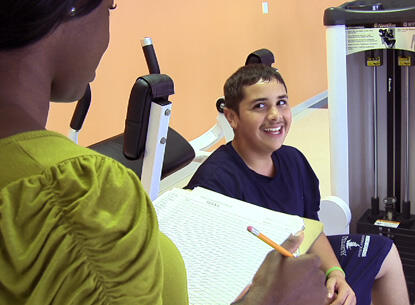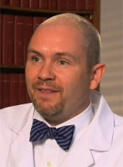
Sept. 10, 2010
Making Healthy Living Fun
Share this story
Two years ago, when 13-year-old David Duran was diagnosed with borderline diabetes, his mother, Leditza Duran, knew things had to change. Years of poor eating habits, sitting around the house watching a lot of television and staying indoors had taken its toll – and now her son was facing a serious medical condition. Worst of all, this could’ve all been prevented.
“We went to the doctor and he was really upset, really mad, because my son — actually both my son and daughter were overweight — the whole family,” recalls Duran.


But then Duran heard about a unique research program at the Children’s Hospital of Richmond at VCU, known as T.E.E.N.S., which stands for Teaching, Encouragement, Exercise, Nutrition and Support, and she knew she had to move her family toward a healthier lifestyle.
The Durans are not alone. In fact, approximately one out of every three teenagers in the United States is overweight, according to current estimates.
Since the mid-1970s, obesity rates in the U.S. have increased dramatically for both children and adults. As a result, children are at an increased risk of developing serious medical conditions such as cardiovascular disease, type 2 diabetes and high blood pressure earlier in life. The Centers for Disease Control and Prevention estimate the annual expenditures related to overweight individuals and obesity to be more than $264 billion.
“There needs to be an increasing message on prevention. As a clinician, I find that unfortunately many times, families have not identified a particular problem until their child has already developed a health condition related to their weight,” said Edmond P. Wickham III, M.D., an endocrinologist with the Children’s Hospital of Richmond at VCU.


T.E.E.N.S., a multidisciplinary weight management clinic dedicated to helping adolescents between the ages of 11 and 18 lead a healthy lifestyle and manage their weight, is the only one of its kind in Central Virginia and includes expertise from across Virginia Commonwealth University and the Children’s Hospital of Richmond at VCU including the departments of pediatrics, exercise science, family medicine and psychology.
The two-year program incorporates sessions between experts and adolescents and their parents on nutrition, physical activity and behavioral support. The program’s newest component targets parents and caregivers of these adolescents, and they learn to be role models to help lead the family toward a healthy lifestyle.
“We’d like to take the information we are learning from the T.E.E.N.S. program and use it to develop effective, sustainable interventions for the prevention and treatment of pediatric and adolescent obesity,” said Wickham, who serves as the medical director of the T.E.E.N.S. program.
Wickham and his colleagues from disciplines across VCU’s campuses are looking at predictors of success for these adolescents. Specifically, they are examining how factors at different levels, ranging from individual physiologic parameters to community structure, impact the degree of success an adolescent experiences in the program.
“There is a realization that this is not a simple problem, and as in most cases, complex problems need complex solutions. We are expanding our research to better define the ways that all of these factors that contribute to obesity work together,” he said.
According to Wickham, the team has found that on average at six months adolescents participating in the T.E.E.N.S. program have a decrease in Body Mass Index (BMI) of approximately 1kg/meter squared. Some participants have lost up to 80 pounds, but there have been cases where a participant has gained weight.
“On average, there is improvement in BMI and in many of the cardiovascular risk factors … blood pressure, cholesterol levels, evidence of insulin resistance, improved fitness markers, improved self-esteem,” said Wickham.
Both Duran’s children, David, and her 17-year-old daughter, Melitza, were enrolled in the program. Both teens believe the program has changed them considerably.
David, who will be completing the program shortly, said, “They teach you about everything. Teach you about nutrition, you’ve got your psychologists here. They teach you about the machines and how to work out on them.”
“My goal was to get as far away from diabetes as possible,” said David who has seen a steady decrease in his weight throughout the T.E.E.N.S. program. “I don’t know where it stopped. I just know I’m far from being diabetic.”
How it works
Adolescents enrolled in the T.E.E.N.S. program participate in regularly scheduled visits that focus on nutrition, physical activity and behavioral support for a period of two years. Recently, the research team added a fourth component – a dedicated parent intervention – which stresses the importance of role modeling and parent behavior.
The nutrition component, a 30-minute session led by a registered dietician, allows the parent or guardian and the adolescent to discuss and explore implications of high risk eating behaviors such as limited fruit and vegetable intake, sugared-beverage intake, eating out, skipping meals, reading food labels and unhealthy snacking. This component works to identify behaviors and work with the family and teen to come up with alternative ways to improve dietary habits. There are no specific calorie goals.
Next, adolescents participate in a physical activity program three days a week. The hour-long sessions are supervised by a team member from VCU School of Education Department of Human Performance at a dedicated gym for the program. For the first 12 weeks, adolescents are expected to go to the T.E.E.N.S. gym three days a week, but are encouraged to take part in some form of physical activity five days a week.
“I had gone to gyms before and never really stuck to it. Then I came here and it was like you had to or else you couldn’t stay here. So it was way better off because I saw my progress and was like, ‘yeah!’” shared Melitza.
Additionally, through a unique partnership with the Richmond area YMCA, families actively enrolled in T.E.E.N.S. are provided memberships to the facility to promote physical activity outside of the program days.
A third component includes behavioral support sessions facilitated by faculty and graduate students from the VCU Department of Psychology. These sessions are designed to engage the adolescent to look at barriers and successes they have endured in terms of making healthy lifestyle changes and take place every two weeks. Initially, the sessions are one-on-one, however, same-sex peer support groups that bring the teens together to discuss their progress are also offered.
For Melitza, the changes she sees in herself have been holistic – she beams about her inner and outer transformation. “It made me more confident about myself. It just made me more confident and it brought me out, because I was always shy and I got out there.”
The dedicated parent intervention, the program’s newest component, stresses the importance of role modeling and parent behavior. The program team recently started collecting data on this component, offered in the first six months of the program. These sessions, led by psychology staff, examine the parent’s health behaviors such as what they’re eating and what they’re doing in terms of physical activity, and specifically target parenting skills. The hope is that the skills taught here will better equip parents and caregivers to enter into positive discussion with their adolescents and minimize conflict with their teens.
Previous research suggests that for young children to maintain a healthy weight or have weight loss it is critical to have parent role models. Preliminary findings by Wickham and the T.E.E.N.S team indicate that in adolescents, as in the younger age groups, parents still play this important role.
Healthy futures
For Duran, the T.E.E.N.S. program has not just made a difference for her children – but the entire family.
These days, Duran estimates that the family’s food choices have changed 90 percent – they are all eating better. Even more, the lifestyle change has brought them closer as a family.
“I feel so happy because that was my dream — that my children would come and learn how to eat better, lose weight and all kinds of other things,” Duran said.
“We changed the whole style of life. We changed everything and actually, they motivated me to do it too. Everybody lost weight. We’re eating better at home and we make better choices. We do more activities outside than inside.”
“I feel like my life changed. I made a really big change in my life and lost 40 lbs. I feel so good for that, because they did and I did, too, so I feel wonderful for that.”
The research program is primarily supported by funding from Virginia Premier Health Plan Inc. Additional support is provided by the Richmond Area YMCA, the National Institutes of Health, American Heart Association, American Cancer Society, Food Lion, The Children’s Miracle Network, the Ronald McDonald House Charities and the former Ukrops Grocery Stores Inc.
Subscribe to VCU News
Subscribe to VCU News at newsletter.vcu.edu and receive a selection of stories, videos, photos, news clips and event listings in your inbox.







